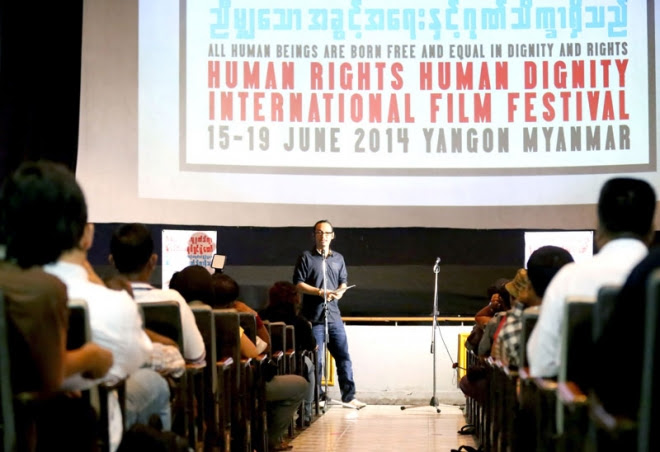Ma Kyel Yi Lin Six, journalist, accomplished novelist, screenwriter for Myanmar Motion Picture Organisation and one of three directors of the short documentary film, The Open Sky, says she dreams of better times for Meiktila, her hometown in Mandalay Region.
After a long absence, a visit to Meiktila late last year deeply affected Ma Kyel Yi Lin Six, prompting her to choose the central Myanmar town – the scene of horrific communal violence in March 2013 that left 44 dead and thousands homeless – as the subject for a 20-minute documentary.

A narrative was developed with her colleagues in a student filmmaking class and they took more than six months to complete the documentary.
In May, The Open Sky was shortlisted as one of the student entries in the Human Rights and Human Dignity International Film Festival and it was scheduled to screen as part of the festival’s competition in June.
It was a chance for the documentarians to relish their hard work.
Instead, as the date for the screening neared, wanton hate speech flourished online about the Muslim and Buddhist themes of The Open Sky. The student filmmakers received vitriolic letters of abuse and anonymous online death threats.
Threats to burn down the Yangon cinemas where the documentary was to screen forced the festival’s organisers to withdraw it from the competition on June 18. The three student filmmakers laid low and The Open Sky slowly became old news.
Ma Kyel Yi Lin Six, 30, moved to Yangon when she was eight, but Meiktila was always in her heart and mind, she said.
“My family is very close-knit and I have many members of my family who still live there,” Ma Kyel Yi Lin Six said.
When we met in a quiet café in Yankin Township a few weeks after the film festival ended, Ma Kyel Yi Lin Six said the decision to withdraw the documentary from the festival had left her devastated.
“I have lost my friends, society and other job opportunities,” she said.
The online attacks against Ma Kyel Yi Lin Six had been personal – and left her so frightened that she closed her Facebook account and switched off her phone for several days.
She did this out of concern for the central characters of the documentary – her Muslim aunt and her aunt’s best friend, a Buddhist.
The documentary focuses on the deep friendship between the two women that had blossomed at a primary school in Meiktila, where they were born.
The violence of the clashes between Muslims and Buddhists in 2013 took the town’s residents by surprise, Ma Kyel Yi Lin Six said. The physical scars of the clashes remain visible in Meiktila in the form of the torched remains of houses, many of them in its Muslim quarter, their shells like a warning to anyone who might challenge the status quo.
During the riots, her aunt sought refuge with her Buddhist friend.
Their friendship is what Ma Kyel Yi Lin Six and her colleagues sought to highlight in their film, she said.
“We made this documentary so that people could see it is possible to live together peacefully,” Ma Kyel Yi Lin Six said. “How is a community supposed to rebuild if it does not know friendship?”
She expressed regret the film had mistakenly been seen as a tool to further divide the community.
“The main idea of this documentary was to show that no matter how different we are, we have the same heart,” Ma Kyel Yi Lin Six said.
“This documentary is for peace. If this would cause any trouble, I will never show it.”
Ma Kyel Yi Lin Six was unaware when our meeting took place that a grassroots movement was emerging in support of the documentary.
Students and advocacy groups were pushing for it to be screened or to be loaded on YouTube.
Some of the film festival’s organisers quietly applied for permits to hold private screening of the documentary. Eventually there were three private screenings. The first, at the Tawwin Rose restaurant on August 9, was attended by four religious leaders of various faiths, as well as the British ambassador, Mr Andrew Patrick.
Among those in the audience was the Venerable Dhamma U Pi Ya, who praised the film’s message.
“Film makers are also spiritual architects of our country,” he told reporters after the screening. “It is the first way for people to amend their mindsets in a sophisticated way. I like the essence of this film.”
Screenings were also held at the Myanmar Institute of Technology on August 11, and at the United States embassy on August 13, where those in the audience included the US ambassador, Mr Derek Mitchell.
Finally, a public screening was organised at the British Council in Yangon later that month where Ma Kyel Yi Lin Six came face to face with some of her harshest critics. Some in the audience persisted with the accusation that she was trying to foment communal tensions by organising the screenings.
But Suzanna Naw Hla Hla Soe of the Peace Network for Karen Women’s Development said she “rejoiced” at having seen the film.
“I want to praise the directors,” she said. “I heard that showing the film could not be accomplished and I was rather unhappy to hear it.”
“This [film] is a good job and I want to encourage them to keep making and distributing films like this.”
Ma Kyel Yi Lin Six doesn’t know what the future holds, but she wants to make more films.
“This process has been like having a baby and now we’ve given birth with this film,” Ma Kyel Yi Lin Six said.
“People can say now that the film’s purpose isn’t to create new conflicts or raise grudges,” she said. “If we show goodwill between people, without showing violence and cruelty, we can help grow kindness and compassion.”



